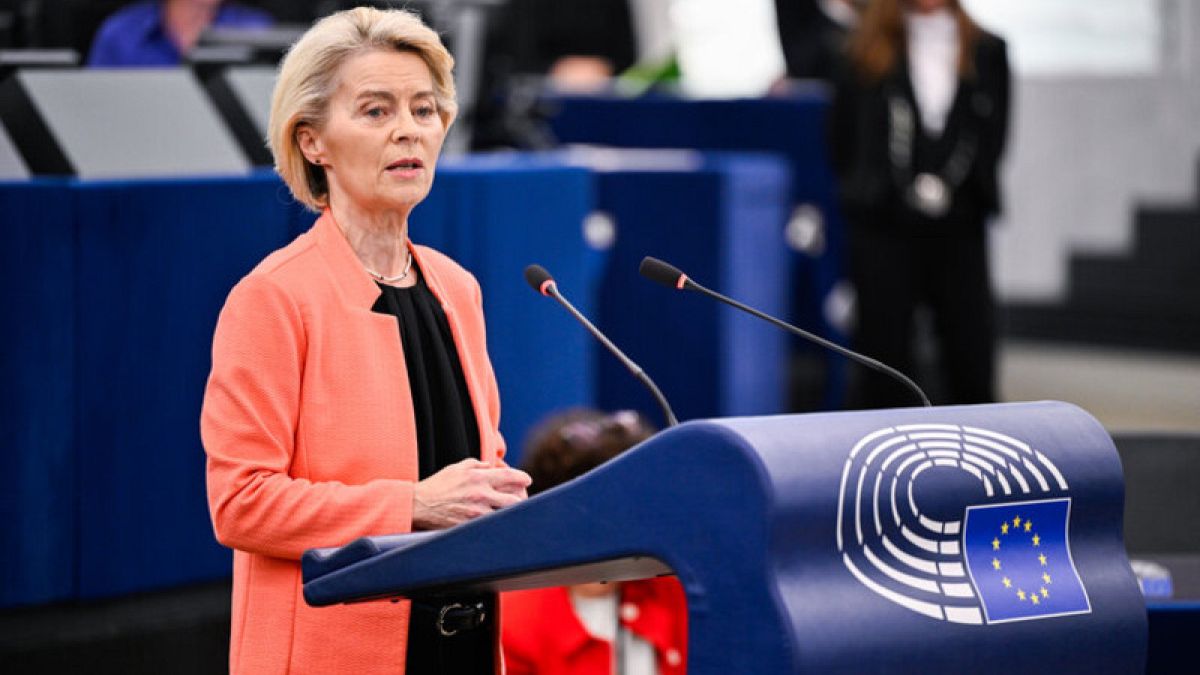In Strasbourg on Thursday 175 MEPs voted in favour of a motion of censure against European Commission President Ursula von der Leyen and her Commission, 360 against, while 18 abstained.
Here are five takeaways from the political groups’ behaviour during the vote which spell trouble for von der Leyen and her team as she manoeuvres the rest of her second mandate as President of the EU executive.
Less support for the Commission
The 360 MEPs who voted against the motion of censure — and therefore defended the European Commission — are fewer than the 370 who approved the Commission back in November 2024.
Although 18 MEPs abstained, 166 MEPs didn’t bother to vote at all, some perhaps weren’t even in Strasbourg.
Beyond the Left’s lawmakers, who had announced they would not show up, several MEPs from the Socialists and Democrats (S&D), Renew Europe, and the Greens/EFA also chose not to take part in the vote.
In many cases, this was a way of expressing their discontent with von der Leyen’s Commission without supporting a motion coming from the far right, and despite their group’s official line to vote against.
“I don’t support far-right motions. At the same time, I don’t trust this Commission, which has systematically betrayed the mandate it received a year ago. I see it every day […] on migration policies, the situation in Palestine, rearmament, climate, and social policies,” said Italian MEP Cecilia Strada after the vote — one of the lawmakers who didn’t cast her ballot.
Of 136 Socialist MEPs, only 98 voted.
Brothers of Italy: Not against the Commission, but not really for either
In November 2024, the Commission was approved with some votes from the European Conservatives and Reformists (ECR), especially from the Brothers of Italy party, and Executive Vice-President Raffaele Fitto was appointed from its ranks.
In the no-confidence vote, a total of 41 ECR MEPs supported the motion against von der Leyen. A small number of conservatives broke ranks: three voted against, siding with parties that support the Commission, and two others chose to abstain.
Italian Premier Giorgia Meloni’s party didn’t vote at all, however. Despite not endorsing the motion and having attacked its promoters in a strong speech by Chairman Nicola Procaccini, Brothers of Italy did not dare to take the side of the Commission — possibly to avoid domestic criticism from the League.
For von der Leyen, this is a signal that Meloni’s support is not guaranteed. The Italian Prime Minister will likely remain loyal to the Commission, but she must manage internal tensions within a group that is largely positioned outside the pro-EU majority.
Greens are still supportive — but for how long?
The Greens/EFA group largely voted against the motion of censure (33 out of 53 Green MEPs), formally backing Ursula von der Leyen’s Commission.
But several MEPs told Euronews that the internal debate the day before the vote had been intense, even though none of them intended to vote in favour of the motion, which was widely seen within the party as led by the far right.
Greens believe that the Commission’s environmental agenda has been largely buried under the so-called “omnibus” legislative packages, while the Green Deal is being dismantled. At the same time, the Commission is advancing a hardline migration policy that is at odds with the group’s views.
Indeed, several MEPs, including Spaniards and Italians, decided not to attend the vote. “We strongly oppose von der Leyen’s track record, so we did not participate,” MEP Benedetta Scuderi told Euronews.
The group now finds itself in a paradoxical position within the European Parliament: acting as part of the governing majority while consistently losing key votes on environmental issues.
How long will they continue to support a Commission that no longer champions their agenda?
Far-right groups feel emboldened
Despite the (widely expected) defeat of the no-confidence motion, its proponent, Gheorghe Piperea, claimed a symbolic victory. “175 votes in favour out of 553 MEPs who voted is a very good proportion,” he told Euronews just after the vote.
“Von der Leyen will now have to balance two contradictory promises in the budget: maintaining the European Social Fund and reallocating resources towards defence spending. I don’t see her mandate as very stable.”
According to sources in the Parliament, far-right parties — possibly led by the Patriots for Europe group — could table a new motion of censure after the summer.
As MEP Piperea put it, this first motion of the legislature was meant to “open Pandora’s box”.
The EU budget will be a real battle
Next week, the European Commission will present its proposal for the next multiannual budget, set to run from 2028 to 2034. And here, the clash with Parliament could intensify.
Budget negotiations — always difficult and contentious — have already become intertwined with the no-confidence vote. The S&D group firmly opposed the motion after reportedly receiving reassurances from von der Leyen that the European Social Fund (ESF) would remain a cornerstone of the next EU budget.
But the European People’s Party (EPP) was quick to dispute this narrative.
“The European Social Fund was never really in danger. We are very clear on that,” said MEP Siegfried Mureșan, the EPP’s lead negotiator for the budget. “As I have said before: the Parliament as a whole will defend the ESF.”
Von der Leyen now faces the challenge of balancing traditional funding envelopes — like agriculture and cohesion — with growing demands for strategic investments in modern priorities. These include continued support for Ukraine, repayment of COVID-19 recovery debt, and increased defence spending.
On top of all that, each political group that defended the Commission against the motion will expect something in return — and they’ll fight tooth and nail to secure funding for their priorities.
Read the full article here


